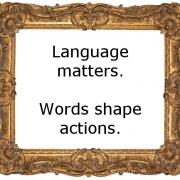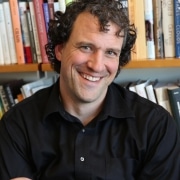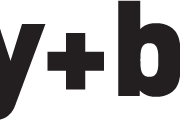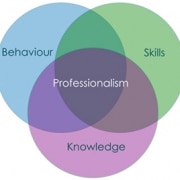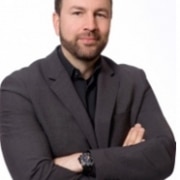Featured Ethics Scholar for October: Charles H.Green
[Ed. Note]: We are expanding our monthly interviews outward from our collaborator network to include scholars from across the ethics community. We look forward to bringing you new perspectives through interviews with a diverse array of thought-leaders. If you want to suggest someone to feature in this column, email Jeremy Willinger.
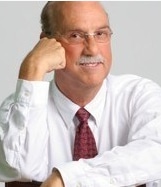 Interview with Charles H. Green, founder and CEO of Trusted Advisor Associates
Interview with Charles H. Green, founder and CEO of Trusted Advisor Associates
What are your main areas of research?
I’m not an academic, so I’ll have to define “research” a little loosely. But for the last 20 years, what I’ve focused on is the role played by trust in business relationships, particularly complex B2B relationships – and particularly in sales and in advisory relationships.
In practice, that has meant pointing out a distinction rarely used in business, even though it’s fairly obvious: the relationship between the trustor and the trustee. You can’t talk about trust in practical terms without distinguishing between those two very distinct roles (though most general discussions about ’trust’ do just that). The trustor initiates the relationship by taking a risk; the trustee responds, or not. And then the roles shift for the next go-round. Trust is iterative, dynamic, and creates itself around risk.
I have also focused on the role of personal relationships rather than institutional relationships, because trust is like politics – as Tip O’Neill said years ago, it’s all local. Or personal, in the case of trust. Institutional trust, like branding, is a far weaker force. The role of institutions in trust is largely to foster or hinder personal trust.
How does your work on trust help companies that want to improve themselves as ethical systems?
Trust and ethics share one feature: they are inescapably about relationships. In the same way that Robinson Crusoe had no need of trust – at least before Friday – so the idea of him being ethical by himself makes little sense.
The ‘rules’ of trust neatly parallel the ‘rules’ of ethics. They are about relations between people; they are built to nurture the long-term sustainability of society; and they consist of symbols, gestures and interactions to achieve their goals.
If you could only highlight one paper or research finding (or piece of work that you’ve been involved with) that relates to designing ethical systems which one would it be and why?
I can’t point to just one paper, but the idea is clear – the connection of trust to risk-taking. Put simply, there can be no trust without risk. If we completely mitigate risk, we destroy trust, by decomposing it either into pure probabilistic analysis or into blind faith.
And, the nature of risk in trust is largely non-cognitive, emotional. We create trust in others only in part by track records and credibility. The stronger components of trust have to do with generosity, vulnerability, communication of emotions, and the like.
The link to ethics is straightforward: a purely utilitarian ethics, based on even the most enlightened self-interest, is a bloodless thing. We don’t call selfish behavior ethical, nor trustworthy – both require a sense that we are operating from higher principles in our dealings with one another, and that we treat each other as complex, more-than-cognitive-only beings.
Risk is the realm in which we convey this. The simple act of proffering a handshake ritualizes this – it says I mean you no harm, and I offer my goodwill up for your acceptance or rejection. When the handshake is returned, it says I too mean well, and accept some mutual sense of obligation. If this is not clear, simply picture what happens when one party extends a handshake, and is spurned by the other. That’s risk, and trust, and ethics in a nutshell.
Tell us about one of your current or future projects.
My writings more and more focus on linking the trust (and ethics) ‘rules’ to micro-behaviors in the commercial realm. For example, what is the psychology behind the question, “Why is your price so high?” and behind our tendency to respond in zero-sum, defensive language? How can we ‘flip’ the question, which feels like a competitive challenge, into an opening for a collaborative and ethical approach to creating greater trust?
The field of sales is a target-rich environment for exploring issues of risk, trust and ethics – it is where individual psychology must interact with the cold rules of corporate behavior, and it exposes nakedly the ethical and trust-based issues lurking in daily interactions. Look no further than the Wells Fargo debacle to see how powerfully sales brings out the best, and the worst, in us.
How did you first get interested in the trust field? What motivated you to take on your current role?
I fell into it. Looking back in the rear-view mirror, I had an undergraduate major in philosophy (which I suppose made me curious), and an MBA and a 20-year career in management consulting, which if you think about it is a field loaded with trust issues – intangible services, difficult to put value on the products, difficult for clients to evaluate the expertise of the experts they hire, etc.
But the trigger event was participating in a large-scale training event hosted by Columbia and Kellog Business Schools for Deloitte and Touche. By chance, a 45-minute time slot in the first of a very long series of sessions opened up, and Rob Galford and I were asked to fill it with the idea of a ‘trusted advisor.’ We were good consultants, we figured, we could throw up a few graphics and generate good discussion.
And so we did, and the client asked us to expand it to two hours, then more. And eventually it became a book, The Trusted Advisor. I followed it up with two more books, and a consulting practice, and voila, there you have my last 20 years.
If you could give one piece of trust/ethics-related advice to individuals, what would it be?
Two things:
First is get comfortable with the truth. Stop spinning. Don’t exaggerate, don’t even aim to ‘always exceed expectations,’ because that means you’re always lying about your intentions to begin with. Get way more transparent, unless it’s illegal or hurtful. When you don’t know something, say you don’t know. Answer questions directly, truthfully and to the point – and ask if they want more.
Second is play the long game. Never think transactionally. Sell as if it were your brother-in-law buying. Act like you’re going to run into everyone again, and like everyone will read everything you write or record – both of which are increasingly true.
If you do these two things, people will trust you, and you will behave ethically. Leaders have an enormous obligation to describe and incent these behaviors – and also to role-model them. Hypocrisy is always a sin, but never more than in the fields of trust and ethics. The most trust-destroying thing you can say is “trust me,” and the most trust-destroying act you can do is to refuse to trust someone else.
If you could give one piece of trust/ethics-related advice to companies, what would it be?
On the purely company side, there are some principles that firms can follow, to establish an environment that nurtures trusting and trustworthy behavior, including telling the truth and playing the long game.
Those principles are client focus, collaboration, long-term focus, and transparency. The usual raft of corporate tools are available and work to instantiate these principles, but in the case of trust, the personal role of the leaders – including role-modeling – cannot be over-estimated. That means conscious and deliberate leadership choices about personal behavior, vocabulary, and the way we interact with others, on a daily basis, are organizational change drivers, in ways that are uniquely powerful with respect to trust.
Featured video of a talk
Featured academic article
Sharpe, Jim, and Charles H. Green “A Note on Trust.” Harvard Business School Technical Note 813-058, August 2012. (Revised October 2015.)


